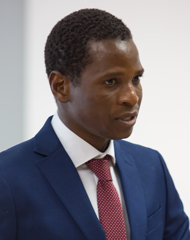"States must take the human rights of migrants seriously and legislate for a common management at the UN level."
The PhD student of the ICS Ernest Thera, originally from Mali, has compared in his thesis the asylum, the entrance, the residency program, the permanence and the integration of migrants in France and Spain.

PHOTO: Manuel Castells
The asylum, the entrance (regular and irregular), the residency program, the permanence and the integration of immigrants in France and Spain has been the subject of a study of a thesis carried out at the Institute for Culture and Society (ICS) of the University of Navarra and defended at the School Law School. Its author, Ernest Thera, a native of Mali, was directed by Caridad Velarde.
The new doctor assures that the work "urges States to take seriously the human rights of migration and also to legislate for a common management at the UN level, as migration is a global phenomenon in a global world and exceeds the national sovereignty of States".
It explains that, at final, the thesis "seeks to promote respect for the rights of immigrants and their integration into the host society, which is what will enable social cohesion in such increasingly multicultural societies."
This comparison of the international, constitutional and infra-constitutional legal rules and regulations of France and Spain on the ius migrandi (migration law) has revolved around two axes. The first is the right of asylum, entrance, residency program and permanence, issues "in which these two countries have much in common," says Thera.
He adds that asylum has a higher level of international and European regulation and consensus, both in terms of convention and custom. "It has been incorporated into international custom since ancient times and is recognized at the international conventional level through the 1951 Geneva agreement and its 1967 protocol ," he adds.
Refugee crisisOn the other hand, he points out that asylum has been Europeanized through the agreement Dublin which allows Member States to deal with claims jointly and the common management of massive asylum flows and the status protracted refugee . "But the refugee crises of 2015 and 2016 demonstrated the weakness of states in their ability to cope with the flows. They did not know how to share responsibilities effectively and equitably," he stresses.
Asylum is also recognized - he notes - in the Constitutional Law of Spain and France and both countries have mechanisms to allow asylum seekers to appeal a negative asylum decision (the right to an effective resource ).
"We have also concluded -he stresses- that unaccompanied minors are the group with the greatest protection in the case of both refugees and migrants". He considers that the greatest difficulty in this case is the determination of the minority of age: "In Spain and France the possibility of carrying out complementary tests is foreseen; the decision in Spain cannot be appealed, which represents a risk of violation of the minor's right to be admitted".
Regarding the residency program, Ernest Thera argues that "except for the right to vote and to be elected to elective political office, immigrants at status regular are entitled to the same rights as other citizens of the nation".
Immigrants at status irregular, however, are - from agreement with Thera - the most unprotected groups in the host countries. "But they are entitled to human rights as 'human beings' and host countries should treat them as such," she remarks.
Intercultural integration, an alternative for integrationThe second axis of the thesis is the integration of foreigners. The new doctor has found that in this respect there is a great distinction between the two countries studied: "France has developed into an assimilationist system, which accepts only the values of the republic in the public sphere and reservation the expression of religious and cultural issues in the private sphere".
In his opinion, it is not possible to speak of a defined integration system in this nation, but "there is a trend towards intercultural integration that reflects the basic principles of citizenship and integration".
Ernest Thera asserts that intercultural insertion is the mode of integration that is being promoted in Europe "because it is perceived as an alternative to the systems of assimilation, multiculturalism... which, as we have seen, have failed. Therefore, intercultural integration is being promoted at all levels of decision making in the States". However, he warns that a bad application "can produce the same conflicts that the assimilationist system produces".





